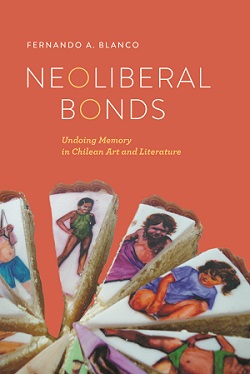Neoliberal BondsUndoing Memory in Chilean Art and LiteratureFernando A. BlancoTransoceanic Studies |
 7/15/15 LITERARY CRITICISM / Caribbean & Latin American LITERARY CRITICISM / European / Spanish & Portuguese LITERARY CRITICISM / Gay & Lesbian 192 pp. 6x9  $34.95 paper 978-0-8142-5216-1 Add paper to shopping cart $34.95 PDF eBook 978-0-8142-7518-4 Add PDF eBook to shopping cart Shopping Cart Instructions Review/Change Shopping Cart & Check-out | |||
|
Explore More |
“Neoliberal Bonds is a unique and vital contribution to the scholarship on post-dictatorial memory in Chile. With a diverse theoretical bibliography and analyses that are sensitive and complex, this is one of the few studies to cross gender, sexuality, and memory studies in a convincing, integrated, and enlightening way. Neoliberal Bonds demands to be known by U.S. Latin Americanists for the nuanced way in which it explores neoliberalism's regulatory mechanisms as they interface with demands for citizenship, equality, recognition, and rights.” —Michael J. Lazzara, University of California, Davis Fernando A. Blanco’s Neoliberal Bonds: Undoing Memory in Chilean Art and Literature analyzes the sociocultural processes that have reshaped subjectivities in post-Pinochet Chile. By creatively exploring the intersections among memory, gender, post-trauma, sociology, psychoanalysis, and neoliberalism, Neoliberal Bonds draws on Lacan’s notion of perversion to critique the subjective fantasies that people create to compensate for the loss of the social bond in the wake of a dictatorship founded on individualism, competition, and privatization. Neoliberal Bonds vehemently criticizes how Chile’s transition governments, through a series of political and legal maneuvers, created the state’s official memory narratives. Blanco argues that the state, the media, academia, and the neoliberal market colluded to colonize and mediatize the “memory scene.” In contrast to these official narratives, Neoliberal Bonds analyzes alternative memory accounts within the visual arts and literature that push back against the state, its institutions, and its economic allies. These alternative memory narratives highlight the ontological fracture of the new neoliberal subjects; they also bring into sharp relief the urgent need for democratization that still poses a challenge to Chile a quarter century after its “transition to democracy” began.
| |||


 Fernando A. Blanco
Fernando A. Blanco